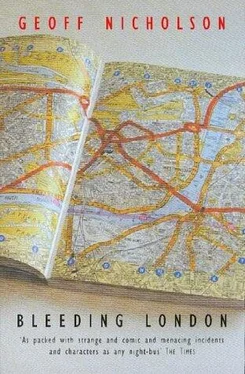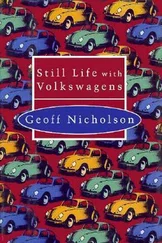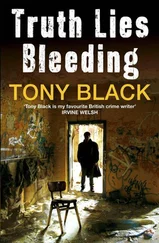The street was not empty. There were quite a few people going to work, a builder’s van was arriving at a house across the street, a postman was making his round. The day was sweetly ordinary, and Mick realized just how tired he was.
They say you never hear the bullet that hits you, and certainly the car that ran down Mick Wilton was on him before he was even aware of the engine noise. All he felt was a metallic scything of his legs from under him, as though someone had clubbed him behind the knees. The big bulk of the car had caught him only glancingly but it was more than enough to put him on the deck, and then a number of men were crowding around him, each one scrambling for the chance to grab him or kick him. He fought back and reckoned that he landed a couple of good kicks of his own, but there was no way he could win. In the end numbers meant everything. He wasn’t even sure his gun would have been any use to him.
Then something short and metallic landed behind his left ear and he saw lights and stars that were no part of the London landscape. He was dazed, close to passing out, but he fought to stop himself. Hurriedly, inexpertly, a bag was put over his head and then he was being stowed into the boot of the car that had run him down. Somebody tried to hit him again but missed, and even as the boot lid slammed shut above him, something told Mick that he was dealing with amateurs.
He could tell by the engine noise that the car was a Mercedes, a much classier job than the one he had back in Sheffield, and not some tarted-up, spoilered, pimp’s car either, something more executive, more of a director’s wagon. It was driven smoothly, unhurriedly, but from the way it hung on the suspension he could tell it had a full load, five or six men inside and, of course, one in the boot.
The journey seemed endless. Then the ride got rough. They were no longer on tarmac, but driving over mud and grass, and Mick heard the tyres crunch on gravel. The car stopped, he heard voices and he was fished out of the boot and made to walk a short distance through the open air to a doorway into some sort of building. The air inside wasn’t as warm as it would have been in a house or office, and he sensed that he was in a large space — a shed or workshop, perhaps another of Robin Lawton’s property developments.
He heard doors closing behind him and he was led across a wide empty floor to a corner of the building, and made to step up into a smaller, more confined space. Once inside, his hands and feet were tied. Again he could tell that whoever was doing the tying up was new to the job and when the ropes were in place he was pushed down on to a small upholstered seat and the bag was removed from his head. He blinked at six faces that were moderately familiar. They were the faces of his six victims, Cabby’s six attackers, but before he could look any of them in the eye one of them punched him in the mouth. It was Philip Masterson, the man Mick had forced to jump off London Bridge. Mick saw Masterson’s left hand, the one with the broken finger, was still strapped up. The right hand, however, as Mick had discovered, was perfectly usable.
“I’ve been looking forward to that,” Masterson said.
A voice behind him, one that Mick didn’t recognize at first, said, “Don’t get too carried away. We don’t want him unconscious.”
“Don’t we?” asked Masterson.
“No, we don’t.”
Masterson resisted the temptation to hit Mick again, but it was a struggle for him.
Mick had a moment to become aware of his surroundings and saw that they were in the carriage of a tube train. Clearly the train was not in service. The seats were ripped and most of the windows were smashed, and perhaps the carriage had been brought to this place to be repaired and renovated. The automatic doors were jammed open and the lights weren’t working. There were some fluorescent tubes far away in the roof of the building, but little illumination seeped down to the interior of the carriage.
Even though it was not a real train, even though it wasn’t crowded, even though it wasn’t in a tunnel beneath the ground, Mick felt a familiar claustrophobia closing in on him, although he was still smart enough to realize that claustrophobia might be the least of his problems. He caught the eye of Robin Lawton, the man whose backside he’d slapped only a few hours earlier.
“I don’t think we should have taken the bag from over his head,” Lawton said. “Now he knows who we all are.”
“That’s right. I want him to know.”
It was Jonathan Sands who spoke, the marine insurance man and boat owner. He had taken on the role of leader, something for which he apparently thought he had a gift.
“Why on earth do you want him to know?” Lawton asked weakly.
Sands said, “Because we have to show people like this that they can’t just attack us, that we aren’t scared of them, that we’re brave enough and strong enough to fight back.”
Lawton looked around him as though checking for possible exits, getting ready to make a quick escape. He said, “Look, this really isn’t my argument. He didn’t do anything to me. He hardly touched me. The worst he did was make a phonecall without paying for it.”
“Oh, come on, Lawton,” Sands said with disgust. “Don’t be such a wimp. You were lucky, that’s all. He might just as easily have beaten you up, humiliated you, destroyed your property, the things you’ve worked for and care about.”
From the way Sands talked it seemed that the damage to his boat had been far more painful to him than the damage to his body.
“But the point is, he didn’t,” Lawton insisted.
“Oh give it a rest, Lawton.”
It was Justin Carr who interrupted this time. He was looking far more self-possessed than when Mick had last seen him, not naked, not singing ‘Maybe It’s Because I’m A Londoner’. He had found a small area of the carriage where he could pace and look good. He smoked a cigarette elegantly and languidly, his manner conveying just the right blend of toughness and sensitivity to win over an imagined audience.
“However, much as I hate to admit it, Lawton has got a point, actually,” Carr went on. “He does know who we are. And those of us with a public profile have rather more to lose than certain others.”
“Precisely,” said Sands. “That’s why we have to teach him a lesson in such a way that it makes an absolute end to this business.”
“Like what?” Carr said. “Pulling his eyes out?”
“Don’t be facetious,” Sands replied.
“Let’s get on with it then,” Masterson said, and he braced himself to start hitting Mick in earnest.
“I’m not sure about this either,” said another voice. It was a light, fluting voice that belonged to Kerry Slater, the plump, masturbatory food critic. He was looking tense and flushed and miserable. He was a long way out of his natural environment and he wasn’t at all happy about it.
“You talked about getting our own back, and I agreed to that,” he said. “But what I had in mind was forcing him to eat some raw ofial or perhaps a couple of pounds of laxative chocolate.”
“Oh, for fuck’s sake,” said Masterson and he belted Mick in the face for the sheer hell of it. It was clear that he would just as willingly have hit Slater.
“Wait a minute!” Sands yelled. “Wait a minute, can’t you? You’ll get your chance to hit him. But first of all I want him to answer some questions for me. I want to know why.”
“Why what?” Masterson demanded.
“Why this little piece of slime got it into his head to attack us.”
“Because he’s a little piece of slime,” Masterson countered. “Because he gets pleasure from it.”
“Are you really as stupid as you pretend?” Sands said. “A piece of slime wouldn’t have known who we were, wouldn’t have come all the way to London from Yorkshire, wouldn’t have tracked each of us down to our homes. He wouldn’t have spied on us. He wouldn’t have learned so much about us, found our weaknesses, wouldn’t have inflicted such specific punishments.”
Читать дальше












